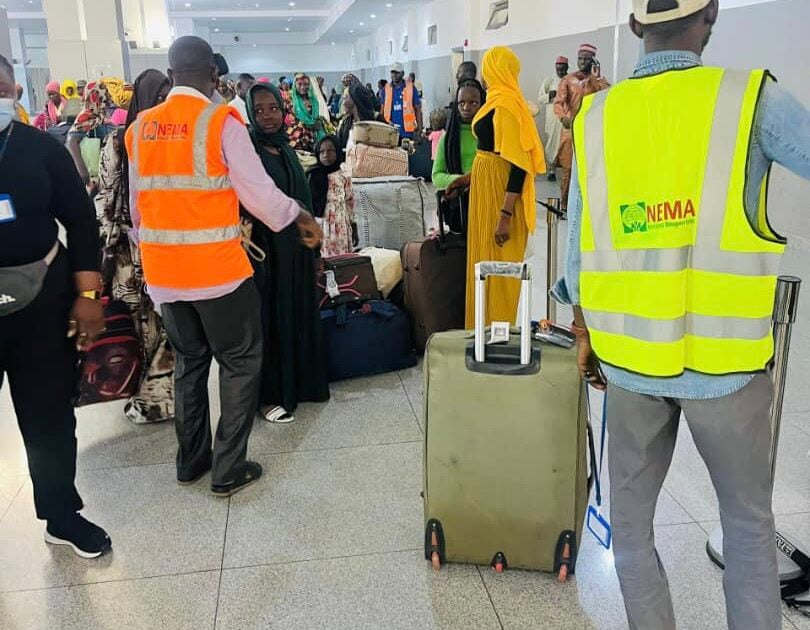Paragraph 1: The Repatriation of Nigerian Migrants from Sudan
The National Emergency Management Agency (NEMA), Kano Operations Office, recently facilitated the return of 148 Nigerian migrants from Sudan. These individuals, comprising 25 men, 27 women, 39 male children, and 57 female children, arrived at Malam Aminu Kano International Airport on a chartered Tarco Aviation flight. This repatriation effort is part of a larger operation by the Nigerian government to ensure the safe return of its citizens amidst the ongoing conflict in Sudan. The conflict has caused widespread displacement and severely strained the country’s infrastructure, necessitating international intervention and assistance for affected populations.
Paragraph 2: Processing and Support for Returnees
Upon arrival, the returnees were transported to the Chila Hotel for profiling and documentation by relevant stakeholders. This process involved verifying their identities, assessing their immediate needs, and connecting them with appropriate support services. Unlike some repatriation programs, these returnees were not enrolled in a formal reintegration program. Instead, they received financial assistance in the form of ATM cards loaded with funds to cover their transportation costs back to their respective destinations within Nigeria. This approach aims to provide immediate support and allow individuals to rejoin their families and communities without delay.
Paragraph 3: The Sudan Crisis and its Impact on Migration
The backdrop of this repatriation effort is the ongoing conflict in Sudan, which has created a humanitarian crisis, forcing millions to flee their homes and seek refuge in neighboring countries or attempt perilous journeys across the Mediterranean. The conflict has exacerbated existing challenges in Sudan, including political instability, economic hardship, and food insecurity. The Nigerian government, along with international partners, is working to mitigate the effects of this crisis on its citizens, both within Sudan and those seeking to return home. The repatriation of these 148 individuals reflects the commitment of the Nigerian government to provide assistance to its citizens affected by the Sudan crisis.
Paragraph 4: Collaborative Efforts and International Partnerships
NEMA’s efforts in Sudan form part of a broader strategy to address the complexities of Nigerian migration abroad. The agency collaborates with various international organizations, including the International Organization for Migration (IOM) and the United Nations High Commissioner for Refugees (UNHCR), to provide assistance to Nigerian migrants facing challenging circumstances in different parts of the world. These partnerships are crucial for sharing resources, coordinating responses, and ensuring that Nigerian migrants receive the necessary support and protection.
Paragraph 5: Combating Human Trafficking and Protecting Vulnerable Groups
Beyond the immediate crisis in Sudan, NEMA’s work extends to addressing the persistent problem of human trafficking, particularly in North Africa. The National Agency for the Prohibition of Trafficking in Persons (NAPTIP) plays a critical role in rescuing Nigerian girls and women from traffickers’ camps in countries like Libya. These efforts often involve complex operations, requiring cooperation with local authorities and international organizations to identify and dismantle trafficking networks. The protection of vulnerable groups, particularly women and children, is a priority for NEMA and its partner agencies.
Paragraph 6: Ongoing Monitoring and Future Challenges
The situation in Sudan remains volatile, and the Nigerian government, through NEMA, continues to monitor developments closely. Further repatriation efforts may be necessary as the conflict unfolds, requiring continued collaboration with international partners. The long-term challenge lies in addressing the root causes of migration, including poverty, insecurity, and lack of opportunities. Sustainable solutions will require a multifaceted approach involving economic development, conflict resolution, and strengthened regional cooperation to create safer and more prosperous futures for potential migrants.














